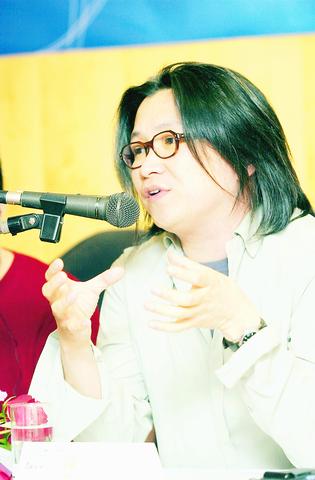The gold mine could be anywhere. You just have to search for it, using the right tools. For many of the producers, financiers and promoters attending the international film symposium in Kaohsiung last week, the tool is international coproductions or crossover productions.
Film industry professionals from Hong Kong, Korea, US, Thailand and Singapore gave strong support for the new trend, which might be the savior of the Taiwan film industry, which has been performing poorly of late.
"Coproductions, which incorporate funds and talent of more than two territories, are the only way to let Chinese-language films step out of the limited market of the Chinese-speaking world," said Peter Chan (陳可辛), executive producer of Jan Dara at the Forum on Film Coproductions and International Promotion for Asian Films, an event taking place under the umbrella of the Kaohsiung Film Festival.

PHOTO: COURTESY OF APPLAUSE
For Chan, Chinese-language films are restricted by the limited and shrinking markets in both Hong Kong and Taiwan. He sees seeking out new markets as the only option.
Speaking of multinational investment, Chan, a Hong Kong-based producer and director, drew on his own experience. His Applause Films was one of the first Hong Kong film companies to bring together talent from across Asia to produce Asian films. Such films include the Thai-Hong Kong coproduction Jan Dara (晚孃), a moody erotic film that received an above-average box office draw throughout Asia, and the Japan-Korea-Hong Kong collaboration, One Fine Spring Day (春逝).
"One of the main reasons for such coproduction schemes is risk-sharing. And another is to be able to create an at least mediocre [box office] record in all the distributed markets," Chan said.

According to Chan, Jan Dara appeals to both the Hong Kong and Thai markets due to the appearance of Hong Kong actress Cristy Chung (鍾麗緹) and Suwinit Panjamawat from Thailand. One Fine Spring Day is based on a Korean story, but draws funds from four countries.
For such "Asian" cross-over productions, you must have a cross-over quality, either in cast or in story. Chan is currently working on a coproduction, Three, which is a three-segment film with three directors, Chan, one director from Korea and the other from Thailand.
Of course, Chan is not the first person open up wider markets for Asian films. Ang Lee (李安), whose Crouching Tiger, Hidden Dragon (臥虎藏龍) was the first "subtitled film" to pass the US$100 million box office mark in the North American market, has had an incredible impact in both the US and Europe.
"One very important reason for Crouching Tiger's success is its international appeal, its combination of martial arts with drama. This is very important for a film to cross-over," said Philip Lee (李少偉).
Lee was the associate producer of Crouching Tiger and played the crucial role of obtaining financing for the film. "Usually if a film can be good enough to span two markets in Asia, there is a 90 percent chance for it open the European market. And probably 50 percent of these films can make it in the US market," Peter Chan estimated.
However, this does not mean that the more personal-styled, or art house film, does not have a chance.
Carrie Wong (黃嘉莉), a producer and founder of Golden Network Asia (嘉聯娛樂), is a good example. She is the producer of all of Fruit Chan's (陳果) works including Little Cheung (細路祥), Durian Durian (榴槤飄飄) and Public Toilet (人民公廁). "Fruit Chan's good performance at European and Asian film festivals is important in helping us find investors from Europe, including those in the UK, France and Japan. And in turn, this helps establish him in these markets," said Wong at the symposium.
"Fruit's pattern for international financing is close to that of Taiwanese filmmakers," Wong added. That is to say, to go to the film festivals, seeking European markets and then come back for Asian or domestic markets.
No company knows more about the niche market for Asian films than Fortissimo, an international film sales company that handled Wong Kar-wai's (王家衛) films, Hou Hsiao-hsien's (侯孝賢) Millennium Mambo (千禧曼波) and Tears of a Black Tiger by Thai director Wisit Sasanatieng and Lover Letter by Japanese director Iwai Shunji.
For the company's founder, Wouter Barendrecht, the uniqueness of these filmmakers means their films will always find a market.
"We all know that Wong Kar-wai's box office in Hong Hong is never that good. But he has over 1.2 million people in France going to see his In the Mood For Love (花樣年華). Who cares now about the Hong Kong market?" said Barendrecht.

June 9 to June 15 A photo of two men riding trendy high-wheel Penny-Farthing bicycles past a Qing Dynasty gate aptly captures the essence of Taipei in 1897 — a newly colonized city on the cusp of great change. The Japanese began making significant modifications to the cityscape in 1899, tearing down Qing-era structures, widening boulevards and installing Western-style infrastructure and buildings. The photographer, Minosuke Imamura, only spent a year in Taiwan as a cartographer for the governor-general’s office, but he left behind a treasure trove of 130 images showing life at the onset of Japanese rule, spanning July 1897 to

One of the most important gripes that Taiwanese have about the Democratic Progressive Party (DPP) is that it has failed to deliver concretely on higher wages, housing prices and other bread-and-butter issues. The parallel complaint is that the DPP cares only about glamor issues, such as removing markers of Chinese Nationalist Party (KMT) colonialism by renaming them, or what the KMT codes as “de-Sinification.” Once again, as a critical election looms, the DPP is presenting evidence for that charge. The KMT was quick to jump on the recent proposal of the Ministry of the Interior (MOI) to rename roads that symbolize

On the evening of June 1, Control Yuan Secretary-General Lee Chun-yi (李俊俋) apologized and resigned in disgrace. His crime was instructing his driver to use a Control Yuan vehicle to transport his dog to a pet grooming salon. The Control Yuan is the government branch that investigates, audits and impeaches government officials for, among other things, misuse of government funds, so his misuse of a government vehicle was highly inappropriate. If this story were told to anyone living in the golden era of swaggering gangsters, flashy nouveau riche businessmen, and corrupt “black gold” politics of the 1980s and 1990s, they would have laughed.

It was just before 6am on a sunny November morning and I could hardly contain my excitement as I arrived at the wharf where I would catch the boat to one of Penghu’s most difficult-to-access islands, a trip that had been on my list for nearly a decade. Little did I know, my dream would soon be crushed. Unsure about which boat was heading to Huayu (花嶼), I found someone who appeared to be a local and asked if this was the right place to wait. “Oh, the boat to Huayu’s been canceled today,” she told me. I couldn’t believe my ears. Surely,